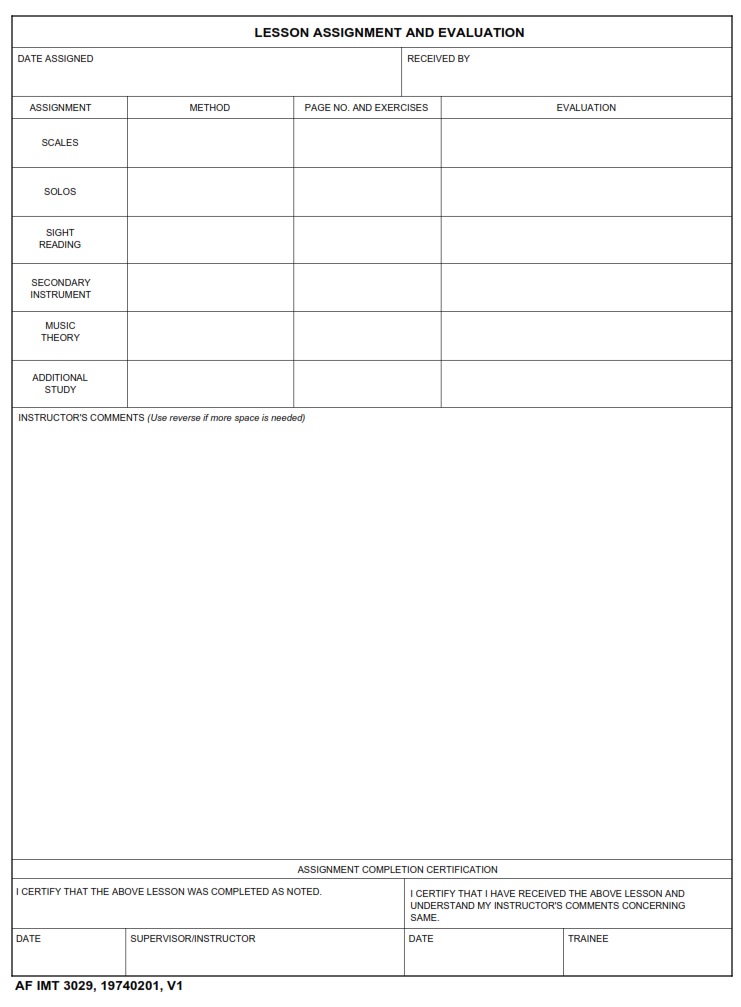AF-FORMS.COM – AF Form 3029 – Lesson Assignment And Evaluation (LRA) – In the fast-paced world of military training, the importance of effective lesson assignments and evaluations cannot be overstated. Enter AF Form 3029 – a powerful tool that serves as the cornerstone for assessing learning outcomes, refining teaching strategies, and ultimately shaping the success of our armed forces personnel. This form, commonly known as Lesson Assignment And Evaluation (LRA), goes beyond mere paperwork; it is a dynamic instrument that bridges the gap between instruction and application, ensuring that every lesson learned translates into tangible skills on the battlefield.
As military professionals strive for excellence in their training regimens, AF Form 3029 emerges as a vital ally in their quest for mastery. Whether it’s honing marksmanship techniques or perfecting combat maneuvers, this form provides a structured framework for instructors to design lessons that are not just informative but also engaging and impactful. By analyzing performance metrics and incorporating valuable feedback, the LRA process becomes a strategic roadmap toward continuous improvement and readiness enhancement within our armed forces. Join us as we delve into the intricacies of AF Form 3029 – shedding light on how this seemingly routine document holds the key to unlocking peak performance in military education and training.
Download AF Form 3029 – Lesson Assignment And Evaluation (LRA)
| Form Number | AF Form 3029 |
| Form Title | Lesson Assignment And Evaluation (LRA) |
| Edition Date | 2/1/1974 |
| File Size | 28 KB |
AF Form 3029 – Lesson Assignment And Evaluation (LRA) (54 downloads )
What is an AF Form 3029?
The AF Form 3029, also known as the Lesson Assignment and Evaluation (LRA) form, plays a crucial role in the Air Force’s training and education system. It serves as a record of an individual’s progress and performance in various courses, ensuring that personnel receive appropriate training to fulfill their duties effectively. The form includes details such as lesson objectives, required reading materials, assessment criteria, and feedback mechanisms to enhance learning outcomes.
Furthermore, the AF Form 3029 not only documents academic achievements but also helps identify areas for improvement and professional development. By analyzing the data collected through these forms, instructors can tailor instruction to meet the unique needs of each student. This personalized approach fosters greater learning engagement and strengthens the overall readiness of Air Force personnel to face diverse challenges effectively.
Where Can I Find an AF Form 3029?
When seeking an AF Form 3029, military personnel can usually obtain this document from their unit’s administration office or through the official Air Force e-Publishing website. It is important to ensure that the form is the most current version to accurately record lesson assignments and evaluations. Additionally, some units may have specific guidelines on how these forms are filled out and submitted, so it’s essential to be familiar with local procedures.
For those in training environments or educational settings, instructors and curriculum developers are typically responsible for creating and distributing AF Form 3029s. This form plays a crucial role in tracking progress and ensuring that learning objectives are consistently met. By engaging with this form effectively, both instructors and learners can benefit from a structured approach to lesson planning and assessment within the Air Force framework.
AF Form 3029 – Lesson Assignment And Evaluation (LRA)
AF Form 3029, also known as Lesson Assignment and Evaluation (LRA), plays a crucial role in assessing learning effectiveness within the military context. This form serves as a valuable tool for instructors to assign lessons, track progress, and evaluate the performance of trainees. By detailing specific instructional objectives and evaluation criteria, AF Form 3029 ensures that training aligns with operational requirements while also promoting accountability and continuous improvement.
One interesting aspect of AF Form 3029 is its emphasis on tailored lesson assignments that cater to individual learning needs. This personalized approach not only enhances skill development but also fosters a sense of ownership among trainees regarding their learning journey. It allows instructors to pinpoint areas for improvement, provide targeted feedback, and guide trainees towards achieving proficiency in essential tasks. Ultimately, the comprehensive data collected through this form facilitates evidence-based decision-making and aids in the overall enhancement of instructional strategies within the military training environment.
